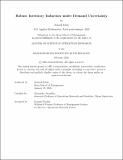Robust Inventory Induction under Demand Uncertainty
Author(s)
Robin, Arnaud
DownloadThesis PDF (1.361Mb)
Advisor
Jacquillat, Alexandre
Terms of use
Metadata
Show full item recordAbstract
E-commerce retailers need to meet growing demand and rising customer expectations while efficiently managing operating costs across global supply chains. This thesis addresses the tactical problem of inventory induction under demand uncertainty, which involves determining where the position incoming inventory to serve future customer demand. We formulate the problem via two-stage adaptive robust optimization with right-hand side uncertainty. First-stage variables characterize initial induction and positioning and second-stage variables capture subsequent rebalancing and order fulfillment. Demand is modeled via an uncertainty set based on an aggregate forecast---at the nation-wide and monthly level---to protect against spatiotemporal deviations---at the local and daily level. We develop a Benders decomposition algorithm, iterating between a lower-bounding master problem and an upper-bounding subproblem. We accelerate the Quadratically Constrained Quadratic Problem (QCQP) subproblem with primal heuristics and dual-bounding strategies---including a novel simplicial relaxation. We also propose a cut-learning strategy from offline instances to warm-start the Benders decomposition scheme. We conduct extensive computational experiments, leveraging an experimental setup build on real-world data and developed in collaboration with a major e-commerce provider. From a computational standpoint, results show the benefits of the acceleration strategies for the subproblem and the master problem which, together, outperform state-of-the-art benchmarks in terms of optimality gaps, solution quality, and computational times. From a practical standpoint, results suggest that the adaptive robust solution can provide significant benefits on average against the deterministic benchmark, by mitigating operating costs by up to 5-10% and improving delivery speeds by up to 1%.
Date issued
2024-02Department
Massachusetts Institute of Technology. Operations Research CenterPublisher
Massachusetts Institute of Technology